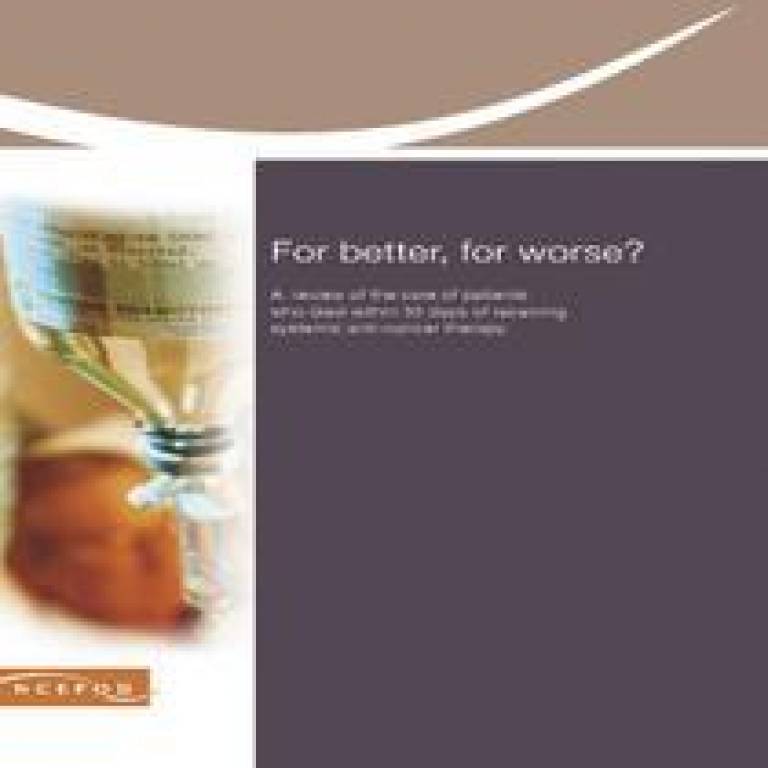Concerns over chemotherapy-treatment for late-stage cancer
13 November 2008
Links:
 guardian.co.uk/society/2008/nov/12/health-cancer-chemotherapy-palliative-care" target="_self">The Guardian article
guardian.co.uk/society/2008/nov/12/health-cancer-chemotherapy-palliative-care" target="_self">The Guardian article
The latest report by the National Confidential Enquiry into Patient Outcome and Death (NCEPOD), published yesterday, raises concerns about the use of cancer therapy to treat patients close to the end of life.
In a study of more than 600 cancer patients who died within 30 days of receiving chemotherapy, the treatment was found to have probably caused or hastened death in 27% of cases.
'For better, for worse?' examines the quality of care provided for this selected group of patients (estimated at 2% of those receiving chemotherapy). Clinical practice and hospital facilities are reviewed and recommendations made on how current cancer services could be improved. Among its contributors were Dr Martin Utley and Professor Steve Gallivan of CORU (Clinical Operational Research Unit), who act as Scientific Advisors to NCEPOD.
Although 35% of the study's patients who died within 30 days of receiving chemotherapy were found to have been given good care, the report's co-author Mr Mark Lansdown, Surgical Oncologist at the Leeds Teaching Hospital, stated that NCEPOD advisors believed that more than 1 in 4 of the patients in the study had died due to contributory factors from the treatment. The majority of the patients involved in the study were receiving the treatment with the aim to "alleviate symptoms of cancer with the minimum of side-effects", but 14% of the subjects were patients for whom the treatment was intended to cure them of their cancer. According to Mr Lansdown, 43% of patients in all suffered significant treatment-related toxicity.
NCEPOD advisors also found that the decision to treat with chemotherapy was inappropriate in 19% of cases, and raised questions about whether cancer patients are given enough information about chemotherapy to allow them to give informed consent to treatment.
Despite these findings, Professor Tom Treasure, Chair of NCEPOD and an Honorary Professor at CORU, said that cancer treatment in the UK today is enormously successful: "Chemotherapy has transformed the outlook for many cancer patients. However, our study asked difficult questions and found some unpalatable answers about decisions made in the weeks before [the patients] died. These merit careful consideration and we have made recommendations for how things could be improved upon."
The report's key recommendations are:
- That consultants should consider reducing the chemotherapy dose for patients who are severely debilitated, have other significant illnesses, or who have already had a number of previous courses of treatment
- That access to emergency treatment for illness caused by chemotherapy should be improved for hospitals treating patients with chemotherapy
- That all deaths within 30 days of chemotherapy should be considered at a "morbidity and mortality" or clinical governance meeting, and that cancer services managers and clinical services directors must ensure that time is allocated for doctors to undertake clinical audit.
'The Guardian' reports that Mike Richards, the National Cancer Director at the Department of Health since 1999, has urged "all chemotherapy service providers to consider these reports urgently and to reassess their own services immediately against the measures we have set nationally".
|
NCEPOD The purpose of NCEPOD, est. 1988, is to assist in maintaining and improving standards of medical and surgical care for the benefit of the public by reviewing the management of patients, by undertaking confidential surveys and research, and by maintaining and improving the quality of patient care and by publishing and generally making available the results of such activities. CORU, established 1983, is a group of researchers within UCL Mathematics who work exclusively on problems related to healthcare. Entirely grant-funded over its 25-year history, predominantly by the Department of Health, the unit has an international reputation for excellence, versatility, innovation and successful dissemination of its work among clinical audiences. To find out more about it and its publications, click on the relevant link at the top of the page, and see also http://www.ucl.ac.uk/silva/news/news-articles/08010/08103103. |
 Close
Close

